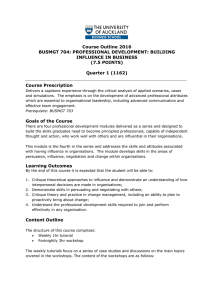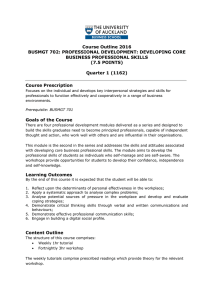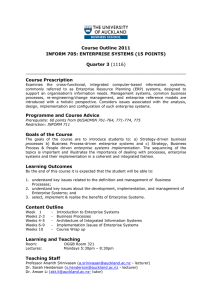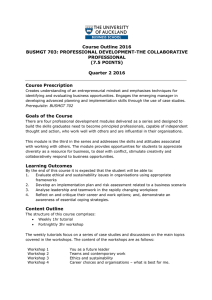Course Outline 2016 INFOSYS 110: BUSINESS SYSTEMS (15 POINTS) SEMESTER 1 (
advertisement
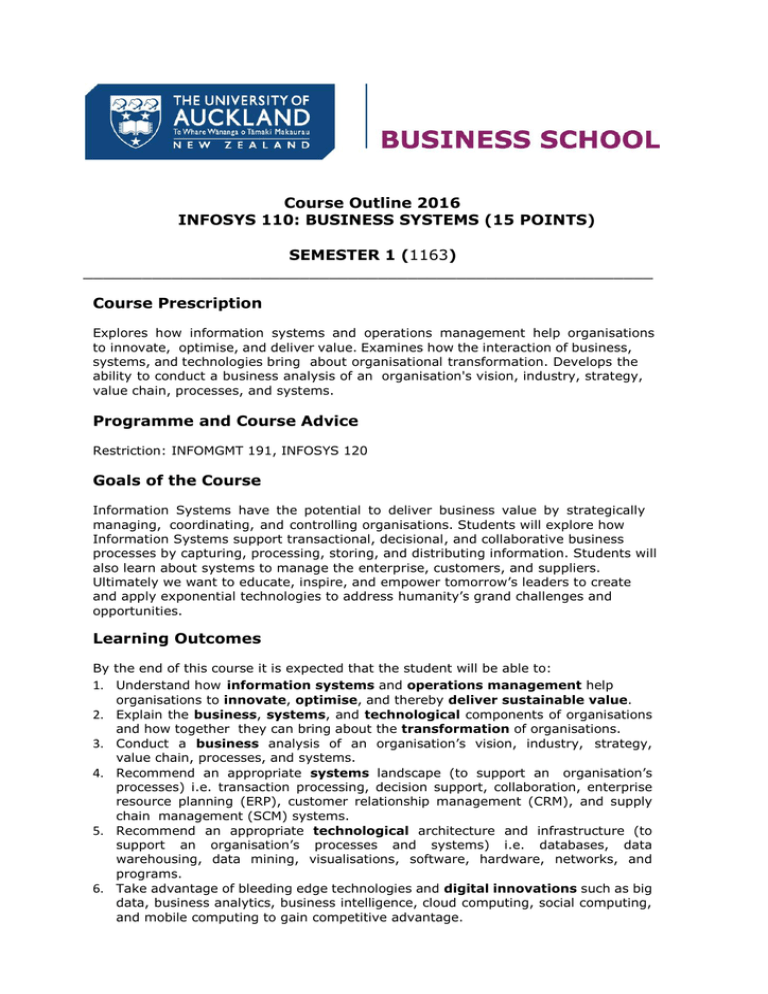
Course Outline 2016 INFOSYS 110: BUSINESS SYSTEMS (15 POINTS) SEMESTER 1 (1163) __________________________________________________________ Course Prescription Explores how information systems and operations management help organisations to innovate, optimise, and deliver value. Examines how the interaction of business, systems, and technologies bring about organisational transformation. Develops the ability to conduct a business analysis of an organisation's vision, industry, strategy, value chain, processes, and systems. Programme and Course Advice Restriction: INFOMGMT 191, INFOSYS 120 Goals of the Course Information Systems have the potential to deliver business value by strategically managing, coordinating, and controlling organisations. Students will explore how Information Systems support transactional, decisional, and collaborative business processes by capturing, processing, storing, and distributing information. Students will also learn about systems to manage the enterprise, customers, and suppliers. Ultimately we want to educate, inspire, and empower tomorrow’s leaders to create and apply exponential technologies to address humanity’s grand challenges and opportunities. Learning Outcomes By the end of this course it is expected that the student will be able to: 1. Understand how information systems and operations management help organisations to innovate, optimise, and thereby deliver sustainable value. 2. Explain the business, systems, and technological components of organisations and how together they can bring about the transformation of organisations. 3. Conduct a business analysis of an organisation’s vision, industry, strategy, value chain, processes, and systems. 4. Recommend an appropriate systems landscape (to support an organisation’s processes) i.e. transaction processing, decision support, collaboration, enterprise resource planning (ERP), customer relationship management (CRM), and supply chain management (SCM) systems. 5. Recommend an appropriate technological architecture and infrastructure (to support an organisation’s processes and systems) i.e. databases, data warehousing, data mining, visualisations, software, hardware, networks, and programs. 6. Take advantage of bleeding edge technologies and digital innovations such as big data, business analytics, business intelligence, cloud computing, social computing, and mobile computing to gain competitive advantage. 7. Leverage various processes and mechanisms to bring about the sustainable transformation of the organisation, i.e. systems development and project management methodologies, the process of adapting to sustaining and disruptive changes, keeping in mind ethical, security, and sustainability considerations. Content Outline The content is guided by our unwavering belief that the teaching of information systems in a business school should be business driven and integrative. Hence we begin the course by looking at BUSINESSES: their vision, industry structure, strategy, value chain, and processes. We then look at various SYSTEMS and TECHNOLOGIES and how they can support the business processes, value chain, strategy, and ultimately the vision of the business. The final part of the course looks at how the interaction of BUSINESS, SYSTEMS, and TECHNOLOGIES could bring about organisational TRANSFORMATION and deliver sustainable value. A conceptual model that illustrates these ideas is as follows: Business Transformation Systems A roadmap that illustrates the four key components (business, systems, technologies and transformation) and details the sequence and flow of the course is as follows: The lecture sequence that supports the roadmap and learning objectives is as follows: Week: Topic: Week 01 Hour 01 Roadmap Week 01 Hour 02 Vision Values Sustainability Week 02 Hour 01 Week 02 Hour 02 Business Industry Analysis Strategic Analysis and Value Chain Analysis Business Process Management Operations Management Week 03 Hour 02 Information Systems Week 04 Hour 01 Transaction Processing Systems Week 04 Hour 02 Decision Support Systems Week 05 Hour 01 Easter – No Lecture Week 05 Hour 02 Collaboration Support Systems Week 06 Hour 01 Systems Week 03 Hour 01 Enterprise Resource Planning Systems Supply Chain Management Systems Week 07 Hour 01 Customer Relationship Management Systems Week 07 Hour 02 Test Review Week 08 Hour 01 Enterprise Architecture Week 08 Hour 02 Data and Database Management Systems Week 09 Hour 01 Week 09 Hour 02 Week 10 Hour 01 Technologies Week 06 Hour 02 Big Data and Analytics Hardware and Networks Internet of Things Cloud, Mobile and Social Computing Week 11 Hour 01 Sustainable Enterprises Week 11 Hour 02 Secure, Ethical Enterprises Week 12 Hour 01 Week 12 Hour 02 Week 13 Hour 01 Week 13 Hour 02 Transformation Week 10 Hour 02 Systems Analysis Programming Project and Change Management Action, Disruption and Digital Innovation Learning and Teaching The material is taught using a combination of lectures and tutorials as follows: 2 x 1 hour lectures and 1 x 1 hour tutorials per week. Students are expected to use at least 7 additional hours each week in reading, preparing for the class, performing online training, working on assignments and so forth. Active participation is essential, and students will be expected to master material assigned in readings and presented in class. In particular, students are expected to: 1. Gain knowledge about information systems through reading, researching, selflearning, and attending lectures and tutorials; 2. comprehend how information systems deliver business value through engagement 3. 4. 5. 6. 7. in class and in tutorials; apply their knowledge of information systems to the business world and reinforce the underlying business and problem solving processes through self-learning, tutorials, games, an assignment, a test, and an exam; analyse, evaluate, and critique real world cases in class, tutorials, homework, assignment, test, and exam; synthesise the knowledge gained and develop information systems designs and solutions in tutorials, homework, and assignment; work in groups to produce reports in written, oral and videoed formats; and obtain feedback from the lecturer, tutors, and peers. Teaching Staff Lecturer 1st Half Dr Anson Li Office:478, Owen G Glenn Building Email: akt.li@auckland.ac.nz Lecturer 2nd Half Ron Tiong Office: 460, Owen G Glenn Building Email: r.tiong @auckland.ac.nz Course Director: Professor David Sundaram Office:476, Owen G Glenn Building Email: d.sundaram@auckland.ac.nz Course Coordinator: Andrew Eberhard Office: 451, Owen G Glenn Building Email: a.eberhard@auckland.ac.nz Learning Resources The required textbook for this course is: Business Systems: Vision to Action Edited By: Khushbu Tilvawala, Andrew Eberhard, Ron Tiong, Asfahaan Mirza, Anson Li, Gabrielle Peko, David Sundaram Publisher: Wiley 2016 ISBN: 9780730330622 This book is only available online via: http://www.wileydirect.com.au/infosys110uauckland/ INFOSYS110 also has a course book that contains information relevant to the course. You can buy this from the UABS Student Resource Center. We use a wide variety of online learning resources such as Excel Training, PeerWise, and Vision2Action Games. Links to these are on Canvas. Assessment Assignment 25% Tutorials Practical Test Final Exam 05% 10% 20% 40% (3 hours, restricted open book) Total Note: 100% Students must pass the final exam to be eligible to pass the course. The broad relationship between these assessments and the course learning outcomes is as follows: Learning Outcome Assignment Tutorials Practical Test Exam 1 X X X X X 2 X X X X X 3 X X X X X 4 X X X X 5 X X X 6 X X X Inclusive Learning Students are urged to discuss privately any impairment-related requirements face-to-face and/or in written form with the course coordinator/lecturer and/or tutor. Student Feedback Student feedback is important to us and has been used to improve the course from semester to semester. Examples of useful suggestions that have resulted in improvements include (but are not limited to): • Refinements to the course schedule/roadmap and content. • Changes to the delivery of material This semester you may be asked to complete evaluations on the teaching of the course, both in lectures and in tutorials. Please note that you do not have to wait until these evaluations are conducted in order to provide feedback. If there is something that you think we could improve then please let us know (via help.infosys110@auckland.ac.nz or in person) as soon as possible. Academic Integrity The University of Auckland will not tolerate cheating, or assisting others to cheat, and views cheating in coursework as a serious academic offence. The work that a student submits for grading must be the student's own work, reflecting his or her learning. Where work from other sources is used, it must be properly acknowledged and referenced. This requirement also applies to sources on the world-wide web. A student's assessed work may be reviewed against electronic source material using computerised detection mechanisms. Upon reasonable request, students may be required to provide an electronic version of their work for computerised review. In the event of an unexpected disruption We undertake to maintain the continuity and standard of teaching and learning in all your courses throughout the year. If there are unexpected disruptions the University has contingency plans to ensure that access to your course continues and your assessment is fair, and not compromised. Some adjustments may need to be made in emergencies. In the event of a disruption, the University and your course coordinators will make every effort to provide you with up-to-date information via Canvas and the university web site.
